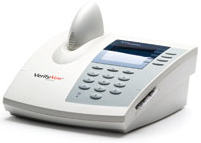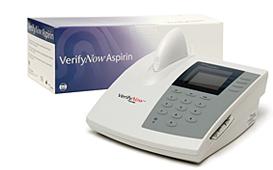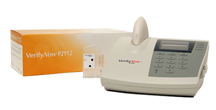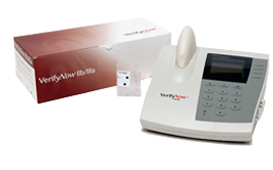|
Accumetrics
is at the forefront of revolutionizing the way doctors
manage the tens of millions of patients who take
antiplatelet drugs to prevent heart attack, stroke and other
potentially life-threatening cardiovascular events.
Accumetrics is a privately-held company based
in San Diego, California. The company develops,
manufactures, and markets the VerifyNow® System, a
comprehensive suite of tests for the assessment of platelet
response to antiplatelet therapies. The tests are fully
automated and easy-to-use allowing physicians an accurate
way to assess platelet response to optimize the
effectiveness of antiplatelet therapies, and to guide
treatment decisions in patients who may be at risk of a life
threatening thrombosis event or bleeding complication.
|
|
 VerifyNow
System: VerifyNow
System:
The VerifyNow
System provides you with an easy, rapid and proven
solution to assess your patient’s response to
antiplatelet medications such as aspirin,
clopidogrel, prasugel and GP IIb/IIIa inhibitors.
The VerifyNow
System helps assess patient’s response to all
antiplatelet therapies
-
Provides
results in less than 5 minutes (additional
sample incubation required, varies by test)
-
Clinically
validated in numerous peer-reviewed studies
-
Minimal
hands-on time
-
Requires no
pipetting or sample preparation, reducing the
risk of pre-analytical error
-
Replaces more
cumbersome and time consuming methods
-
Is
reimbursable through CPT and ICD-9 codes
 VerifyNow
Aspirin Assay VerifyNow
Aspirin Assay
Aspirin binds to
the COX-1 enzyme to prevent the conversion of
arachidonic acid to thromboxane A22,
which result in platelet activation. The VerifyNow®
Aspirin Assay utilizes arachidonic acid as the
agonist to measure platelet function specifically
along this pathway. Research shows that patients'
response to aspirin varies1,2, and up to
a quarter of patients are not responding adequately
to its antiplatelet effects.3
These patients are 2-3 times more likely to have a
major heart attack or stroke.3 The
VerifyNow Aspirin Assay provides a simple
measurement to determine whether or not a patient is
responding to their aspirin therapy.
References:
-
Lev EI et al. Aspirin
and Clopidogrel Drug Response in Patients
Undergoing Percutaneous Coronary Intervention. J
Am Coll Cardiol 2006;47(1):27-33.
-
Lee PY et al. Low-dose
aspirin increases aspirin resistance in patients
with coronary artery disease. Am J Med
2005;118(7):723-7.
-
Gum PA et al. A
prospective, blinded determination of the
natural history of aspirin resistance among
stable patients with cardiovascular disease. J
Am Coll Cardiol 2003;41(6):961-5.
 VerifyNow
P2Y12 Test VerifyNow
P2Y12 Test
Thienopyridines such as Plavix® (clopidogrel) and
Effient® (prasugrel) block the P2Y12 ADP binding
site on the platelet. The VerifyNow P2Y12 Test uses
an ADP agonist to induce platelet activation and
ascertain the level of platelet reactivity impaired
by these medications. It also incorporates a second
channel containing thrombin receptor agonists to
approximate baseline reactivity so that there is no
need to discontinue antiplatelet medication. Studies
show that up to 30% of patients taking Plavix have
low levels of platelet inhibition (reactivity)1,2
and do not receive the expected antiplatelet effect
which may increase the risk of ischemic events or
unnecessarily delayed from surgery. The quantitative
test is a simple measurement to help assess the
patient’s level of response to their therapy.
References:
-
Malinin, A.
et al. Monitoring Platelet Inhibition after
Clopidogrel with the VerifyNow P2Y12 Analyzer:
The Verify Thrombosis Risk Assessment (Veritas
Study). Thromb Res 2007;119(3):277-284.
-
Serebruany,
VL. et al. Variability in Platelet
Responsiveness to Clopidogrel among 544
Individuals. J Am Coll Cardiol 2005;45:246-51.
 VerifyNow
IIb/IIIa Assay VerifyNow
IIb/IIIa Assay
Glycoprotein (GP) IIb/IIIa inhibitors such as
ReoPro® and Integrilin® are fast acting and powerful
inhibitors of platelet aggregation that prevent the
binding of platelets to fibrinogen. The VerifyNow®
IIb/IIIa assay utilizes a thrombin receptor
activating peptide as an agonist to maximally
stimulate the platelet and determine the level of
platelet function. Research shows that patients’
response to weight-based dosing varies, and the
assay provides clinicians with an accurate
assessment of platelet blockade within two minutes
from the time of sample collection. |